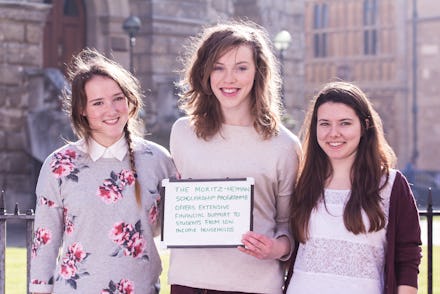Oxford's New Student Diversity Campaign Has One Glaring Problem

Remember last week when a group of Oxford students launched a campaign to raise awareness around their school's lack of diversity? Well forget that. Here's what's really going on:
The new blog "We Are All Oxford" is aimed at combating the so-called misrepresentation and "negative portrayal" the university received after the "I, Too, Am Oxford" project. Its centerpiece is a photo series featuring students of "mixed" backgrounds — read: mostly white — holding up signs that explain how awesome and inclusive Oxford actually is.
For a telling example, here's a white guy with a whiteboard that reads: "Your brain NOT your background opens Oxford's doors." Thanks for the tip, buddy.
And here are the rest:
The participants seem to mean well, as their blog intro assures us: "We would like to emphasise that we do not aim to undermine the original campaign and we are not working against them. We acknowledge that racism exists at the University of Oxford and it needs to be challenged, but we believe that the university is working hard to tackle these prejudices and misguided perceptions. Our aim is to present the full picture."
But in reality… What they're missing are the numbers that gave "I, Too, Am Oxford" such real-world resonance. Oxford's track record of accepting black applicants is especially damning, with 2011's whopping 32 incoming black students constituting a 10-year high. That was out of 3,200 possible spots. Admission success rates for black applicants are also comparatively low — whites are often twice as likely to be accepted.
The Oxford website conspicuously omits any mention of racial or class demographics. But Labour Party MP David Lammy led an inquiry into the nation's top schools in 2010, revealing, among other things, that 89% of Oxford's student profile is upper and middle class. Lammy said of the findings process: "Our proudest universities were obstructive in responding to my inquiries. They provided patchy data, challenged valid requests and deliberately pushed back their deadlines ... If Oxford and Cambridge are ashamed of these statistics, they are right to be."
In the end: The result is university environments where the homogeny exposed in "I, Too, Am Oxford" thrives unchecked. And regardless of any positive experiences that "We Are All Oxford" presents, the numbers and their resulting ignorance stay the same. The underlying issues go far beyond what these individuals have faced.
These campaigns arrive following similar diversity awareness projects in the U.S., including at Harvard and UCLA. Time will tell if they result in any long-term changes.